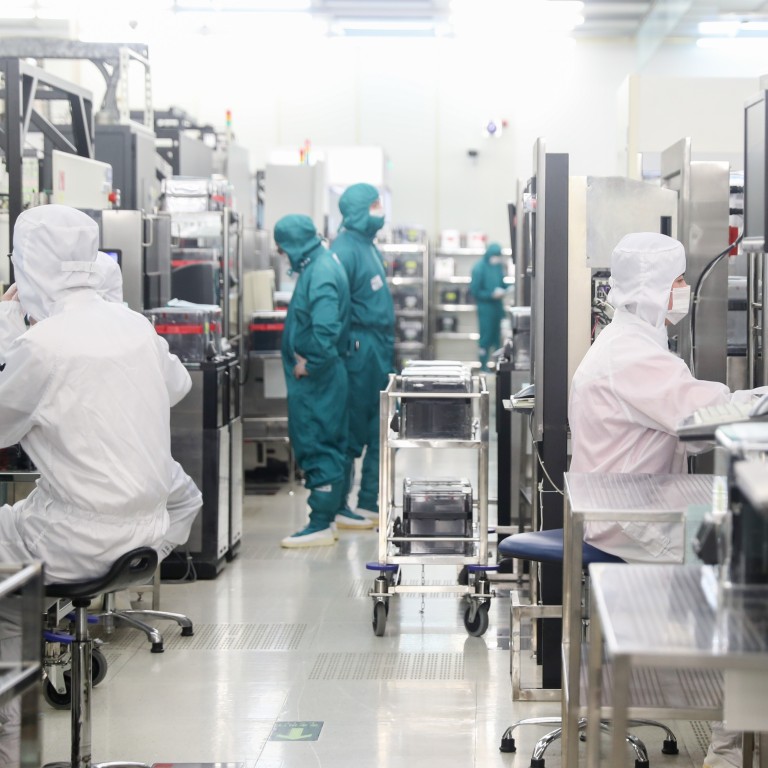
US-China decoupling to be accelerated by tightening of technology export controls, experts say
- Under the leadership of US President Donald Trump, Washington this week broadened restrictions on technology exports to China to keep products away from the military
- Experts expect severe supply chain disruptions and accelerated decoupling as the coronavirus row also inflames the relationship between the two superpowers
The Trump administration’s move to tighten export controls on technological goods to China this week will help accelerate the decoupling of the world’s two largest economies, experts have said.
The move is designed to keep key technology products away from the Chinese military, broadening existing controls and accelerating a process which has been under way for a number of years.
Chinese firms will accelerate efforts to “de-Americanise” their supply lines, while foreign firms may be forced to do the same if they wish to continue to work with China and “avoid the long arm of the US law”, since the measures give the US Department of Commerce more control over the resale of American goods, such as semiconductors, internationally.
These developments are exactly what the Chinese leadership has been cautioning against over the past few years
“These developments are exactly what the Chinese leadership has been cautioning against over the past few years, and risk adding evidence to the argument that US businesses are ‘unreliable’,” said Nick Marro, global trade lead at the Economist Intelligence Unit. “That term carries a lot of weight, and has previously been used in China to justify switching from imported foreign components to domestic alternatives.”
“As the US tightens the chokehold, tech companies in China and elsewhere will double-down on efforts to de-Americanise their supply chains,” said Alex Capri, a supply chain specialist at the National University of Singapore.
The regime has also been broadened to include any company that has dealings with the Chinese military – a measure which is likely to see many Chinese firms banned from buying American supplies due to the murkiness of corporate ownership in China.
“This is very significant, it eliminates civilian license exceptions and will constrain US sales of items like semiconductors into China further,” said Ben Kostrzewa, a trade lawyer at Hogan Lovells in Hong Kong and former assistant general counsel at the Office of the US Trade Representative. “Because of the opacity in the system, once implemented, these measures are going to have a serious bite to them.”
Already, lawyers and consultants are fielding high volumes of calls from worried Chinese technology companies, as they try to plan for the new rules, which will also apply to Russia and Venezuela.
Given the time taken to process licenses for export, and the need for a higher volume of national security inspections of both products and buyers, it will also create logistical challenges.
There is only one US export control officer currently stationed in Beijing, and while it is understood authorities are hiring a second to deal with an expected higher volume of inspections, delays and bottlenecks are expected.
“This new list of restrictions could possibly create a new kind of Entity List, but this time it is unilateral, the [US] Department of Commerce does not need the support of other agencies,” said Matt Bell, who heads the export controls and sanctions division at FTI Consulting, referring to a previous US government blacklist which froze out Chinese technology companies including Huawei from their US suppliers.
Bell added that because the announcement sees the department assert more control over re-exports of US goods, “it is an extra business cost to comply with this, it is adding a burden for non-US companies”.
We are concerned these broad rules will unnecessarily expand export controls for semiconductors and create further uncertainty for our industry during this time of unprecedented global economic turmoil
This could lead to a “designing-out” of American content from technology goods made outside the US, which would be a big hit for US companies. The ruling has thus attracted criticism from US technology bodies.
“While we understand military-civil fusion trends demand smart and targeted national security responses, we are concerned these broad rules will unnecessarily expand export controls for semiconductors and create further uncertainty for our industry during this time of unprecedented global economic turmoil,” said John Neuffer, CEO of the US Semiconductor Industry Association.
Chinese firms, on the other hand, will be forced to “make their own, get their supplies elsewhere, or live with the ruling until they can change things up”, added Capri at the National University of Singapore.

